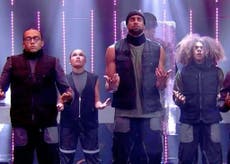Britain’s Got Talent: Man jailed after repeatedly calling police to complain Ant McPartlin was on TV
Viewer was frustrated that presenter appeared on TV after drink driving conviction

Your support helps us to tell the story
From reproductive rights to climate change to Big Tech, The Independent is on the ground when the story is developing. Whether it's investigating the financials of Elon Musk's pro-Trump PAC or producing our latest documentary, 'The A Word', which shines a light on the American women fighting for reproductive rights, we know how important it is to parse out the facts from the messaging.
At such a critical moment in US history, we need reporters on the ground. Your donation allows us to keep sending journalists to speak to both sides of the story.
The Independent is trusted by Americans across the entire political spectrum. And unlike many other quality news outlets, we choose not to lock Americans out of our reporting and analysis with paywalls. We believe quality journalism should be available to everyone, paid for by those who can afford it.
Your support makes all the difference.Britain’s Got Talent star Anthony McPartlin returned to television in 2019 after a hiatus following his conviction for drink driving – but not everyone was happy to have him back.
A Welsh man who kept calling police to complain that McPartlin was still on television after his conviction has been jailed for 19 weeks. He had been on a suspended 10-week sentence before this case began.
McPartlin did not go to prison for drink driving. He was charged an £86,000 fine and given a 20-month driving ban.
David Kates-Lowick, 57, admitted to breaching an order by contacting Dyfed-Powys Police when it was not a genuine police matter.
The prosecutor said four calls were made to the police in three days, during which Kates-Lowick told call handlers he was frustrated that McPartlin could still drive and be on TV when others had lost their jobs over similar convictions.
The defence argued Kates-Lowick had called the 101 non-emergency line, not 999, and added that the contents of the phone calls suggested he had “significant mental health issues” and constituted “a plea for help”.



Join our commenting forum
Join thought-provoking conversations, follow other Independent readers and see their replies
Comments